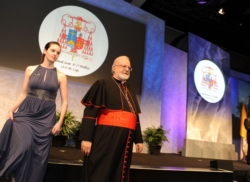From Cardinal Seán’s blog
As I am sure many of you heard in the news, this week the state of Arizona passed a law that makes it a crime under state law to be an undocumented immigrant. Perhaps most disturbingly, the new law allows police to stop anyone they suspect of being undocumented and to demand they show proof of citizenship.
It is disturbing to see such anti-immigrant prejudice being stirred up again in the United States. It was not long ago when we Irish (and other European Catholics) were the objects of this same nativism and there was a negative attitude towards us, our Church, and our culture. We have always been an immigrant Church in the United States, and we must have a special regard for those who are coming to our shores. Certainly, the United States has a right and an obligation to control its borders but, at the same time, we also need just and reasonable immigration laws. The fact that there are millions of undocumented people in the United States is an issue it behooves us to resolve. These people are paying taxes, are part of our work force, and are part of our community. It would be impractical, and indeed impossible, to deport all these people. The only way that we can really heal the situation is by coming up with a path towards legality, but that must be part of a comprehensive immigration program that has reasonable quotas. Sometimes, our quotas do not represent what the work force really needs in the United States.
Having spent my whole life working with immigrants I can say that the Europeans would love to have our problem. The children of immigrants who come to this country -- whether they come documented or undocumented -- will be Americans, and they will identify with this country, defend it and be part of this body politic.
Unfortunately, the proposals of President Bush and the Kennedy-McCain Bill did not pass. I realize that today’s economic climate makes it more challenging to deal with the issue, but it needs to be dealt with at a national level and with great regard for the social justice questions involved. This issue cannot be solved through the hysterical response of local communities that will cause a great human suffering, discrimination against our own Hispanic citizens and legal residents, and deeper divisions within an already polarized community.
Catholic University of America Gala Dinner
On Friday, I was in Atlanta for the annual Catholic University of America Cardinal’s Dinner, which raises funds for scholarships for the school.
It’s always a great encouragement to see the fine young Catholic men and women who are coming out of the university.
This year the gala was hosted by Atlanta Archbishop Wilton Gregory. The cardinals and the nuncio were there, as were many members of the Board of Trustees, of which I am a part.
There were a number of students from the Archdiocese of Boston there as well. I was happy to be with them.
One of the students came up and introduced himself to me. I immediately recognized him from his name -- Bobby Kilner. He had sung the “Star Spangled Banner” at the dinner.
He is one of nine children, and his father was also one of nine children. His grandparents belonged to my Teams of Our Lady -- a Christian family movement -- when I was a young priest. His father was one of my students at Catholic University. It was a great joy to see this young man who has just graduated with a degree in philosophy and is very dedicated to his faith.
Cursillo Mass
Monday evening (April 26), I had a Cursillo Mass at St. Patrick Parish in Stoneham.
We had about 1,200 people there for the Mass. It was an opportunity for me to thank them and talk to them about evangelization, and the important role Cursillo has had in my own life and the life of the Church. I also encouraged them to be faithful to their “fourth day.” For those unfamiliar with the term, the “fourth day” makes reference to the Christian call to live faithfully every day as they learn to live the faith during the three days Cursillo retreat.
As usual, the singing was just overwhelming. Someone said to me after the Mass, “What if the singing at our Sunday Masses was like it was here tonight?”



















